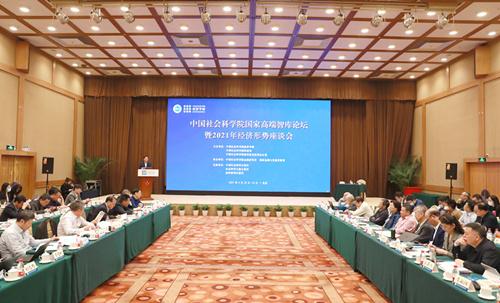CASS forum explores economic studies
Author:GAO YING Source: Chinese Social Sciences Today 2021-04-29
CASS National High-End Think Tank Forum sheds light on economic studies, in Beijing, April 20–22. Photo: Zhu Gaolei/CSST
Experts exchanged ideas on economic studies and offered policy suggestions at the National High-End Think Tank Forum hosted by the Chinese Academy of Social Sciences (CASS) in Beijing on April 20–22.
Theoretical innovation
Since the global financial crisis’s outbreak in 2008, it has been difficult for Western mainstream economics to explain and predict economic phenomena that emerged after the crisis. Development of economic theory has thus entered a stage of differentiation, disintegration, and reconstruction, said CASS President Xie Fuzhan.
At present, the Chinese economy’s importance to and influence on the world economy continues to increase, providing a historic opportunity for China’s economic theoretical innovation, Xie said.
Xie suggested studying the prospect of a long-term global economic stagnation and a new round of industrial revolution in the post-pandemic period. It is necessary to delve into factors affecting China’s long-term economic development, as well as real estate regulation and other practical issues, to deepen research on the urbanization rate, the reform of state-owned enterprises, financing costs of small- and medium-sized enterprises, and analyze the number of new market entities.
It is important to conduct in-depth practical investigations, clarify the problems and crux of each issue, and put forward countermeasures and suggestions that are in line with the current development situation, Xie said.
As China has entered a new stage of development, the macroeconomic analysis paradigm must be adjusted accordingly, to reveal the major characteristics of the new stage, said CASS Vice President Gao Peiyong. In the new stage, the country’s development environment is facing profound and complex changes, with instability and uncertainty increasing significantly. The proposal to construct a new development pattern is directly related to the profound and complex changes facing the country’s development environment.
Development of the external environment has evolved from quantitative changes to qualitative changes, posing a major threat to China’s economic security and national security. As such, “security” is highlighted when building a new development pattern, which essentially requires coordinating development and safety, Gao said.
Policy suggestions
Cai Fang, chief expert of the National High-End Think Tank at CASS, expounded on the impact of population aging on economic growth. He said that Japan’s population growth has seen two turning points. One is that the peak and negative growth of the working-age population brought a supply-side shock, and the other is that the peak and negative growth of the total population brought a demand-side shock. When the first demographic turning point appeared, both the demand side and the supply side were affected to a certain extent, but the potential growth rate of the supply side declined more prominently. By the time the second demographic turning point occurred, the demand side was more affected than the supply side, which indicates that there is potential to expand the growth rate on the demand side.
The economic growth downturn, which was frequently discussed, meant a decline in the supply side’s potential growth rate, which is also called the supply side’s new normal. Judging from Japan’s situation, a new normal on the demand side is likely to emerge in the future. This is the theoretical and policy wisdom brought to us by observing Japan’s population aging. China has not really stably crossed the middle-income stage, and must avoid repeating Japan’s mistakes.
Li Yang, director of the Economic Division at CASS, said that ultra-low interest rates and even negative interest rates have now become a long-term phenomenon, posing severe challenges to the traditional financial operation order. They have also caused the deterioration of the external environment, the expansion of an interest rate gap between China and other countries, and deteriorating financial operating conditions.
“In this regard, we should have comprehensive countermeasures,” Li suggested.
First, in the domestic and international dual circulations, more attention should be paid to internal equilibrium, and it is not appropriate to sacrifice internal equilibrium in order to maintain external equilibrium, such as exchange rates and capital flows, Li said. At the same time, we should focus on medium and long-term development for China’s economy, and rationally use the space for interest rate cuts.
In addition, Li suggested effectively monitoring cross-border capital flows, opening the domestic financial market in a controlled and orderly manner, and maintaining domestic financial security.
It is also necessary to deepen supply-side structural reforms, while focusing on changes in the core factors affecting interest rates, such as population growth rate, capital-labor ratio, total factor productivity, and taking effective measures, Li continued.
To accelerate domestic financial reform, Li suggested deepening reform of commercial banks, promoting reform of pension mechanisms, encouraging development of various non-bank financial intermediaries, and fueling the healthy development of financial technology. Moreover, China also needs to develop a multi-level capital market, Li concluded.

